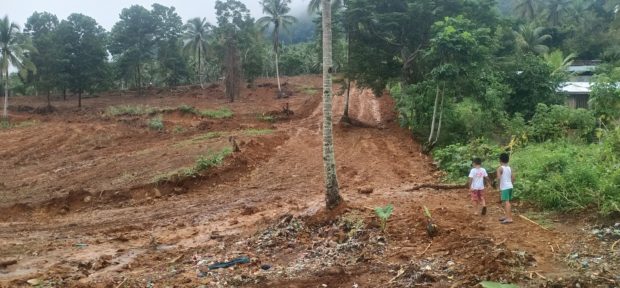Water district questions issuance of ECC to housing project near Agusan watershed

According to the San Francisco Water District, a 4-hectare sloping area inside the buffer zone of Mount Magdiwata watershed has become a hazardous area after a developer bulldozed it to build houses. (Photo by CHRIS V. PANGANIBAN / Inquirer Mindanao)
SAN FRANCISCO, Agusan del Sur, Philippines — Opposition has stepped up against a 4-hectare housing project being developed in this town on sloping land inside the one-kilometer buffer zone of the Mount Magdiwata watershed following the government issuance of an Environmental Clearance Certificate (ECC).
Officials of the San Francisco Water District (SFWD) repeated their objection to the project on learning that the Caraga office of the Department of the Environment and Natural Resources (DENR) had issued an ECC to the developer, Bayugan City-based Marrea Estates Corp.
The SFWD general manager, Elmer Luzon, has sent a letter urging the DENR Caraga regional director, Albert Arcamo, to revoke the ECC, saying: “We cannot afford to allow destruction of the natural ecosystem of its [SFDM] reserve forest as it will adversely affect the sole source of the water supply of this town.”
A total of 1,658 hectares of the watershed, the main source of potable water of this town, is fully delineated as a protected area under Presidential Proclamation No. 282 issued by President Fidel Ramos in 1994.
The SFWD board of directors has passed a resolution strongly opposing the project and called for the revocation of ECC No. ECC-OL-R13-2021-0113 dated June 9 issued to Marrea Estates.
Article continues after this advertisementAccording to Arcamo, however, an ECC is not a permit but rather a set of conditions that the developer will have to comply with before starting work on the project.
Article continues after this advertisement“The ECC is therefore not a license for any project proponent to undertake the activity they sought to operate as they will have to secure permits from other concerned government agencies,” Arcamo explained in his letter to SFWD.
The DENR in Caraga has admitted their fault in failing to inform the San Francisco municipal government of the resumption of the ECC application of Marrea Estates.
Citing a DENR memorandum circular, Arcamo maintained that permits or clearances were no longer necessary in processing the ECC. But he said stakeholders and concerned government agencies, like the SFWS, would be required to take part in the presentation of the result of the Environmental Impact Assessment, which is the basis for an ECC issuance.
Luzon rebuked Arcamo, pointing out the location of the project in an area classified as environmentally critical based on the geohazard assessment of the Mines and Geosciences Bureau (MGB).
The project site, Luzon also noted, is categorized under areas with a critical slope, recharge area of aquifer, and water bodies based on a memorandum issued by the Environmental Management Bureau of the DENR.
Concerned residents expressed alarm over the massive flooding in the town center brought about by Tropical Depression Vicky on Dec. 18 last year. They said it could have been triggered by the clearing of the sloping land even as no ECC had been issued at that time.
One resident, John Columban Paredes, showed on a geological map of the town how water cascaded down a slope that a bulldozer had cleared, submerging outlying communities at the foot of the mountain.
Julito Cerna Pacna, a 57-year-old Manobo tribesman in San Isidro, recalled that in the past “the bulk of water coming from Mt. Magdiwata watershed during rains would just slowly cascade following the natural waterways and creeks.”
Mardie Para, the project engineer of Maria Estates, explained that there were no creeks when they first visited the area. But there were deep portions where the water flowed had been bulldozed by the previous developer who sold the area to Maria Estates.
“We have no intention to destroy the environment and the lives of people living below. We enter the area in good faith,” Para said.
But Bonifacia Arevado, a resident of the area, insisted there was a creek inside the area where they used to wash their clothes and take a bath.